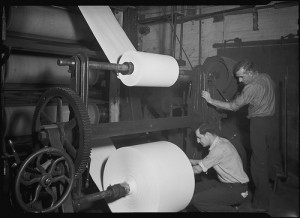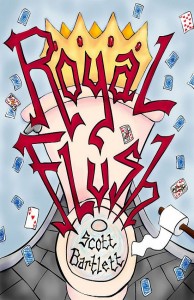Dont quit your day job is a line that most writers are all too familiar with: even talented writers with a few contracts under their belt find it difficult to make ends meet purely from writing fiction.
But balancing writing and a full-time job can be a difficult endeavour, and many novelists seek ways in which they might focus on their writing while still keeping the wolf from the door.
Scott Bartlett, author of humorous fiction, including the recently released Royal Flush, has committed to taking a year off in order to focus on his fictionbut this isnt the first time that hes done so.
Ive used my savings to take a year off before, and I also received a grant during that time to write a novel, says Scott, who plans to apply for another grant in the spring.
My ultimate goal in these efforts is to reach a point where I can support myself from my writing. Until that happens, Ill continue to seek income from other sources in whatever way best complements my writing career.
Having supportive friends and a supportive family certainly helps, and Scott is relieved that no one has ever tried to dissuade him from trying to become a professional writer.
I recently wrote a blog post joking about this, actuallyhow people like Elvis Presley and Albert Einstein had detractors at young ages to help harden their resolve, but everyone I know has been nothing but encouraging.
How can an author avoid the lure of Twitter and LOLcat memes?
Although being able to append full-time writer to ones biography is a goal for many writers, often the reality isnt quite as life affirming as its sounds: unscheduled days and the lure of the internet can be a perpetual struggle. Scott has recognised this as a potential issue and has taken steps to avoid it.
Lately Ive been grappling with some pretty big projects, and Ive found it helpful to bring them into small, daily chunks. For instance, Im working on recording the first part of my novel'Royal Flush'as a small audiobook, to help promote it, and I work on that an hour every day.
He is also working on the fourth draft of his third novel, and sets himself a goal of 15 pages a day.
I try to get writing and editing done first, since my brain works best in the morning. I save stuff that requires less cognitive function for later in the day. Things like marketing'Royal Flush, going through my RSS reader, interacting on social media, etc.
Scotts efforts to market Royal Flush have been concerted, and hes just finished a month-long blog tour for the book.
My goal was to get the word out there about my book while meeting others bloggers, and I must say it was successful in that regard. The links are still listed on my blog, and they serve as great material for people who want more info before deciding whether or not to buy my book.
How should an author seek out, and respond to, criticism?
Scott is pragmatic when it comes to not everyone necessarily liking his work: humour is extremely subjective, and for that reason humorous fiction can often be a niche endeavour.
I think its necessary to accept that not all readers will share my sense of humour. Like any novel, the task at hand is for'Royal Flush'to find its audience. Its a very quirky book, and while many have found enjoyment in that, others havent. It definitely isnt for everyone.
That said, Scott is mindful of the value of criticism and how critical opinions can be used to improve his work: although he disagrees with some of the feedback he receives, he doesnt allow himself to be offended by others opinions of his work.
I realised pretty early on that getting too emotional about criticism would only stunt my development as a writer. I write with people in mind, so it would be silly for me to invite others to read my work and then reject everything they say. In fact, I insist that anyone I send my work give only their honest opinion. Nothing else would be useful!
Your turn:'If youre a writer, how do you go about scheduling in your writing? And for the readers, how do you go about squeezing in all of that reading you simply have to do?
'About Royal Flush:'As his kingdom careens toward catastrophe, the King cruises seedy taverns looking for likely maidens.'His incompetence and his weakness for beautiful women drag him deeper and deeper into trouble. He is portrayed as a cross dresser by the Kingdom Crier (the Kingdom's most popular tabloid). Shortly after, he must defend his castle against a siege with only his royal fiddler'while attempting to steal his royal fiddler's girlfriend.
Scott Bartlett is'a fiction writer and environmental activist'from Newfoundland, Canada. His novel'Royal Flush is'a recipient of the H. R. (Bill) Percy Prize.'In May 2011, Scott received a grant from the NLAC to write his third novel, called'Taking Stock. In February, the NLAC awarded it the'Lawrence Jackson Writers' Award, and on May 5th it received the'Percy Janes First Novel Award.
You can visit him online at his website.
 Send to Kindle
Send to Kindle





















Check out my interview with @readinasitting! I discuss quitting my job to write and my books upcoming audio recording: http://t.co/NjRLkaO3
Sounds like a funny book!
Coincidentally I just watched this video how another author writes full time and supplements her income with teaching classes and workshops. She also points out that making time to be around people is important to writing stories. https://www.authorlearningcenter.com/videos/confessions-of-a-full-time-writer-video
Quite a few authors take on teaching and workshop roles in order to help make ends meet, definitely. I think its pretty much the norm here in Australia where the market is so very small that it can be hard to make a living purely from fiction. Certainly the social aspects of these sidelines help as well. I know that if Ive spent a few weeks working from home I end up utterly overjoyed to get to interview someone or go and meet with someone! :)